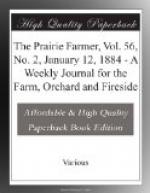Happy young friends, sit by
me,
Under May’s blown apple-tree;
Hear a story, strange and
old,
By the wild red Indians told,
How the Robin came to me:
Once a great chief left his
son,—
Well-beloved, his only one,
When the boy was well-nigh
grown,
In the trial-lodge alone
Left for tortures long and
slow
Youths like him must undergo,
Who their pride of manhood
test,
Lacking water, food and rest,
Seven days the fast he kept,
Seven nights he never slept.
Then the poor boy, wrung with
pain,
Weak from nature’s overstrain,
Faltering, moaned a low complaint;
“Spare me, Father, for
I faint!”
But the chieftain, haughty-eyed,
Hid his pity in his pride.
“You shall be a hunter
good,
Knowing never lack of food;
You shall be a warrior great,
Wise as fox, and strong as
bear;
Many scalps your belt shall
wear,
If with patient heart you
wait
One day more!” the father
said.
When, next morn, the lodge
he sought,
And boiled samp and moose-meat
brought
For the boy, he found him
dead.
As with grief his grave they
made,
And his bow beside him laid,
Pipe and knife, and wampum-braid—
On the lodge-top overhead,
Preening smooth its breast
of red
And the brown coat that it
wore,
Sat a bird, unknown before.
And as if with human tongue,
“Mourn me not,”
it said, or sung;
“I, a bird, am still
your son,
Happier than if hunter fleet,
Or a brave, before your feet
Laying scalps in battle won.
Friend of man, my song shall
cheer
Lodge and corn-land hovering
near.
To each wigwam I shall bring
Tidings of the coming spring;
Every child my voice shall
know
In the moon of melting snow,
When the maple’s red
bud swells,
And the wild flower lifts
its bells.
As their fond companion
Men shall henceforth own your
son,
And my song shall testify
That of human kin am I.”
Thus the Indian legion saith
How, at first, the robin came
With a sweeter life from death,
Bird for boy, and still the
same.
If my young friends doubt
that this
Is the robin’s genesis,
Not in vain is still the myth
If a truth be found therewith:
Unto gentleness belong
Gifts unknown to pride and
wrong:
Happier far than hate is praise—
He who sings than he who slays.
_—J.G. Whittier in St. Nicholas._
AFTER TWENTY YEARS.
The following tale of love and faithful waiting is told the New York World by its Canton, Ohio, correspondent:




